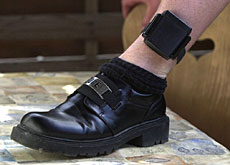Foreign prisoners face forced repatriation

Foreign prisoners held in Swiss jails could be sent back to their homeland to complete their jail terms later this year.
The Swiss say they are acting on humanitarian grounds, but critics fear foreign detainees may be repatriated against their will.
Until now, Switzerland has only sent home detainees who agreed to the move. But Switzerland, in line with 32 other countries, recently signed the Council of Europe’s additional protocol to the Convention on the Transfer of Sentenced Persons.
Switzerland is expected to ratify the protocol in the coming weeks, as no legal obstacles stand in the way. There has been no opposition to the move, and human rights groups including Amnesty International have kept quiet.
Ratification means that forced repatriations would become possible. Detainees could be sent back to countries such as Romania, Serbia, Macedonia or Bulgaria.
Discourage criminals
“The first aim of the protocol is to improve the reintegration of convicted persons in society,” said Folco Galli, spokesman for the Federal Office of Justice.
According to Galli, another aim is to reduce the number of foreign detainees in Swiss prisons, who represent 70 per cent of the country’s 5,000-strong prison population.
The Swiss are also hoping the new measure will discourage foreign criminals, who could end up serving time in prisons that make incarceration in Switzerland seem far more attractive.
The Federal Justice Office has so far refused to estimate the number of possible repatriations, and cannot say if any prisoners will be transferred this year.
A certain number of criteria must be fulfilled before a detainee can be returned home. He or she must still have at least six months to serve, and a court must order the repatriation.
The prisoner’s homeland, even if it has signed the protocol, must also accept the transfer.
Finally, a detainee has the right to appeal against the decision to Switzerland’s Federal Court.
Detention conditions
For André Valloton, the head of canton Vaud’s prison service, the change is for the better.
Switzerland currently returns all foreign detainees to their homeland once they’ve served out their sentence, as long as human rights are respected in that country.
Valloton says that completing their terms in their home country prepares prisoners better for a return to civil society.
But he adds that many of those currently held in Swiss prisons are concerned about the prospect of being sent home to complete their sentences.
“The biggest concern is detention conditions in some countries,” he told swissinfo. “In Romania or Moldova, for example, conditions are sometimes inhuman or degrading.”
Valloton sees the system working properly only if detention conditions are the same as in member states of the Council of Europe.
But he warns of another problem. Prisoners from these states form only a small part of Switzerland’s jail population.
“We can’t expect those who export their criminality to sign this kind of convention,” he told swissinfo. “They have no interest in repatriating problems that stem from their own deficient social conditions.”
Swiss ties
Fguiri Kais, a member of the Federal Foreigners Commission for the past four years, is worried about the forthcoming change.
For the Tunisian, repatriating a prisoner who has no ties to Switzerland is not a problem, but he warns this represents just a small number of detainees among the foreign prison population.
Kais is against sending prisoners with a valid residence permit back to their homeland.
“If a detainee lives here, or his family lives here, and he had a residence or a work permit, expelling him would only make his situation worse,” he told swissinfo. “It would only damage his family.”
swissinfo, Pierre-François Besson (translation: Scott Capper)
Switzerland is expected to apply the additional protocol of the Convention on the Transfer of Sentenced Persons.
There has been no opposition to the ratification of the protocol, which will allow the Swiss authorities to forcibly repatriate a foreign prisoner.
The protocol can only be applied under certain conditions, and a prisoner will have the right to appeal to the Federal Court against his or her extradition.

In compliance with the JTI standards
More: SWI swissinfo.ch certified by the Journalism Trust Initiative












You can find an overview of ongoing debates with our journalists here . Please join us!
If you want to start a conversation about a topic raised in this article or want to report factual errors, email us at english@swissinfo.ch.